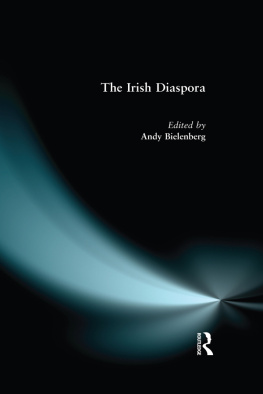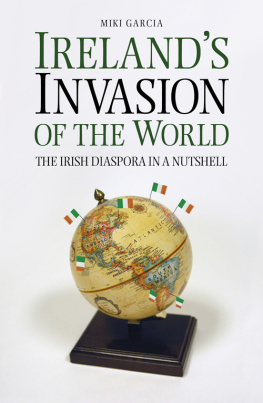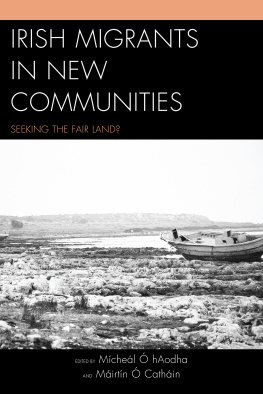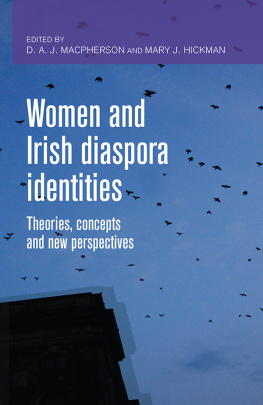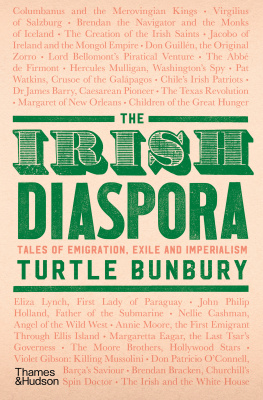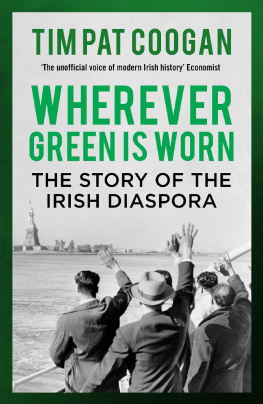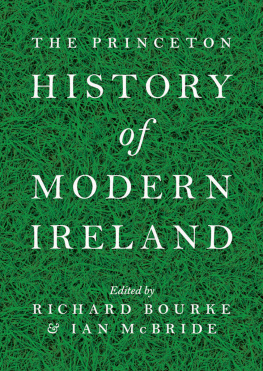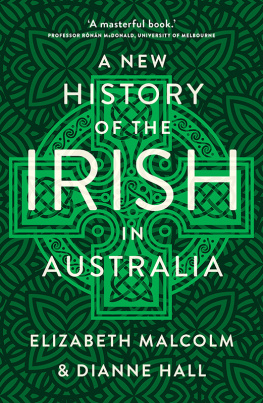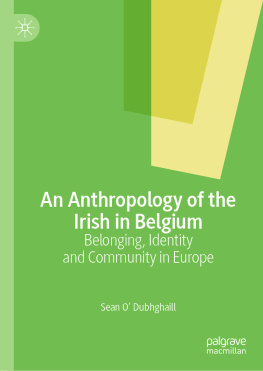The Irish Diaspora
This book is dedicated to the late Dr. John OBrien of the Department of History, UCC, who died in 1999 but is not forgotten.
First published 2000 by Pearson Education Limited
Published 2013 by Routledge
2 Park Square, Milton Park, Abingdon, Oxon OX14 4RN
711 Third Avenue, New York, NY 10017, USA
Routledge is an imprint of the Taylor & Francis Group, an informa business
Copyright 2000, Taylor & Francis except Chapter 6 Donald Harman Akenson
Chapter 9 has already appeared in New Hibernia Review, who have kindly assigned temporary Copyright to the Publisher. This temporary assignment of copyright extends the lifetime of The Irish Diaspora.
All rights reserved. No part of this book may be reprinted or reproduced or utilised in any form or by any electronic, mechanical, or other means, now known or hereafter invented, including photocopying and recording, or in any information storage or retrieval system, without permission in writing from the publishers.
Notices
Knowledge and best practice in this field are constantly changing. As new research and experience broaden our understanding, changes in research methods, professional practices, or medical treatment may become necessary.
Practitioners and researchers must always rely on their own experience and knowledge in evaluating and using any information, methods, compounds, or experiments described herein. In using such information or methods they should be mindful of their own safety and the safety of others, including parties for whom they have a professional responsibility.
To the fullest extent of the law, neither the Publisher nor the authors, contributors, or editors, assume any liability for any injury and/or damage to persons or property as a matter of products liability, negligence or otherwise, or from any use or operation of any methods, products, instructions, or ideas contained in the material herein.
ISBN 13: 978-0-582-36997-9 (pbk)
British Library Cataloguing-in-Publication Data
A catalogue record for this book can be obtained from the British Library
Library of Congress Cataloguing-in-Publication Data
The Irish diaspora / edited by Andy Bielenberg.
p. cm.
Includes bibliographical references and index.
ISBN 0-582-36998-3 (alk. paper) ISBN 0-582-36997-5 (pbk. : alk. paper)
1. IrishGreat BritainHistory. 2. IrishCommonwealth countriesHistory. 3.
IrelandEmigration and immigration. 4. Irish AmericansHistory. I. Bielenberg, Andy,
1959
DA125.I7 I72 2000
941.0049162dc21
99053717
Typeset by 35 in 10/12pt Sabon
Contents
Piaras Mac inr
Graham Davis
Richard B. McCready
Tracey Connolly
Breda Gray
Brendan Halpin
Donald Harman Akenson
Kerby A. Miller
Ruth-Ann M. Harris
Malcolm Campbell
Patrick McKenna
Andy Bielenberg
Michael Holmes
Donal P. McCracken
Angela McCarthy
Damien Courtney
Jim Mac Laughlin
Enda Delaney
Guide
The genesis of this book emerged from a conference on the Irish Diaspora held in UCC in the autumn of 1997. It is therefore necessary to thank those who contributed to the conference, other than those who appear in this book. These include (in alphabetical order): Verdi Ahern, Pat Coughlan, Jim Devere (the founding patron of the Irish Centre for Migration Studies at UCC), Marian Elders, Siobhan Finn, Paddy Fitzgerald, Marita Foster, Prof. D. Keogh, J.J. Kett, Prof. J. J. Lee, John Lynch, Ruth McDonnell, Mel Mercier, Vic Merriman, Lucette Murray, Alph OBrien, Prof. W. Smyth. On the production side I would like to acknowledge the assistance of Hilary Shaw and Magda Robson of Pearson. Thank-you one and all.
Andy Bielenberg
November 1999
PIARAS MAC INR
(Irish Centre for Migration Studies, University College, Cork)
Migration studies: a rapidly changing field
Migration studies is a catch-all term encompassing a multidisciplinary field. It includes emigration (often the sole focus in Ireland and other exporting countries), immigration, internal and return migration. denotes a de-centred approach in which migration, migrants and their multi-generational societies and cultures are seen as phenomena in themselves and not simply in relation to the countries of origin and reception.
For most of its relatively short life, migration studies has focused disproportionately on immigration. This is not surprising. The immigrant is a real presence in the receiving society; the question of how natives and newcomers are to relate to one another is not an abstract one. If one adds to this sheer numbers and an ideology of openness towards the immigrant, characteristic of historical attitudes in the United States (especially if the subject in question is white and European), it is hardly surprising that American scholarship has long been dominant in migration studies. Even if Ravenstein have been American-inspired or have at least begun on American campuses.
By contrast, it would have been easy, at least until relatively recently, and especially in the Anglophone world, to underestimate the role of migration in European society. Yet France, for instance, has attracted large numbers of immigrants for centuries. within the state. In late twentieth-century Europe the upsurge in global forced migration, as opposed to economic migration, and the challenge posed by a potentially transnational European Union (EU) citizenship, are helping to define a new agenda. The shape of this new agenda is far from clear as yet and must regrettably be characterized for now as driven more by a desire to contain than to embrace.
The entire question of migration, the migrant identity and the place of migrants in society is the subject of global consideration from within many disciplines. Issues of multiculturalism, multi-ethnicity and hybridity are being explored; in the process the supremacy of a unitary, place-based ethnic identity is being called into question. With globalization and the increasing integration of the world economic, cultural and information infrastructure, there is an increased danger of the emergence of a migrant elite on the one hand and a disempowered community of transients, serving the needs of an implacable globalized economy, on the other.
Previous assumptions of a discrete Ravensteinian, push-pull universe, divided between place of origin, intervening variables and place of arrival, reflected in a one-way assimilationist path, are being challenged by new realities. Migrancy, to use Chamberss Diasporic identities, transnational and subversive in character, challenge the security of identities defined, but also limited, by national boundaries.
There has been a major shift in the terms of the debate and the nature of the enquiry, hence the new emphasis on life history approaches, discourse analysis and feminist perspectives. The comparative context of migration studies is receiving increasing emphasis. The specificities of migration, in terms of region, gender, class, ethnic and other factors, are receiving attention, as is the global and interlinked nature of migration. The impact of migration on the person at the heart of the process is also beginning to be studied. While the role of historical enquiry continues to be central, social science, legal, literary and behavioural approaches, as well as neo-Marxist and other structuralist perspectives, are all being brought to bear.

